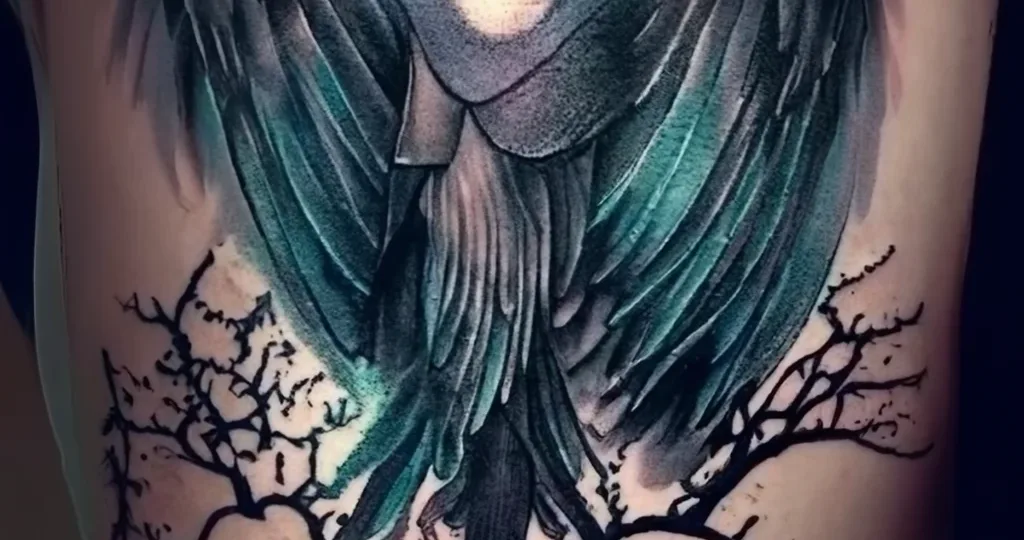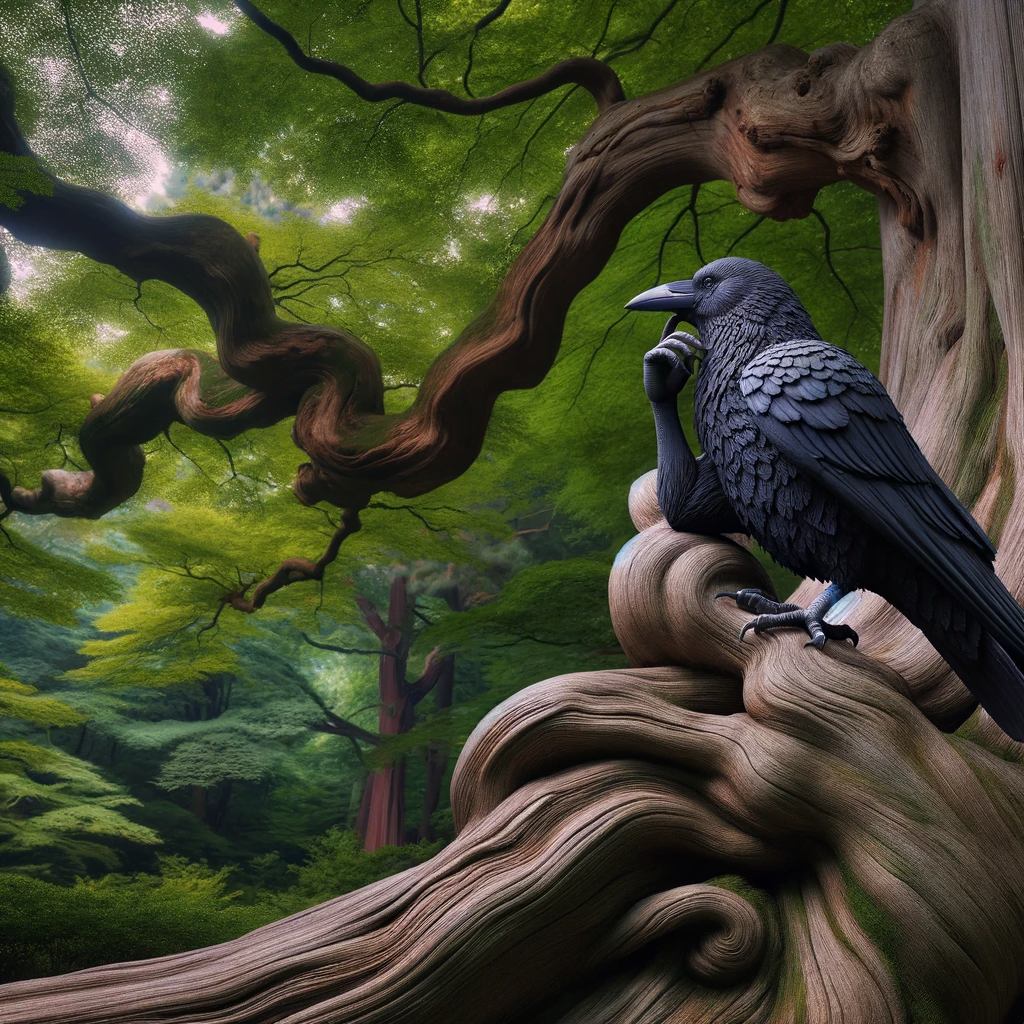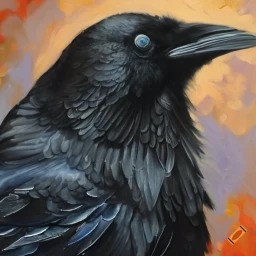Unforgettable Encounters: A Close Encounter with Black Crows
December 30, 2023 | by BlackCrow.com

Getting to Know Black Crows
Black crows are fascinating creatures that have captured the interest and curiosity of humans for centuries. In this section, we will introduce you to black crows and share some intriguing facts about them.
Introduction to Black Crows
Black crows, scientifically known as Corvus species, are medium-sized birds that are part of the crow family. They are highly intelligent and have a distinct appearance with their black feathers and sturdy beaks. Black Crows are found in various parts of the world, including North America, Europe, Asia, and Australia. They have adapted well to a wide range of habitats, including forests, grasslands, and urban areas.
Black crows are known for their distinctive cawing sound, which can be heard echoing through the skies. They are highly social birds and often form large black crow flocks, which can be a mesmerizing sight to behold. These birds exhibit complex behaviors and have been observed using tools, solving puzzles, and even playing games.
Fascinating Facts about Black Crows
- Black crows are highly adaptable and are considered one of the most intelligent bird species. They have excellent problem-solving skills and can even recognize human faces.
- These birds have a diverse diet and are known to be omnivorous. They feed on a variety of foods, including insects, fruits, seeds, small animals, and carrion.
- Black Crows are excellent communicators and use a wide range of vocalizations to convey messages to their flock members. Each crow has a unique voice, allowing them to be recognized by their companions.
- These birds are known for their long lifespans, with some individuals living up to 20 years or more in the wild.
- Black Crows are highly protective of their territories and will defend them vigorously against intruders, including other birds and mammals.
- They are monogamous birds and often mate for life. They build large nests made of twigs and line them with softer materials like feathers and fur.
By delving into the world of black crows, we can gain a deeper appreciation for these intelligent and captivating creatures. In the following sections, we will explore their habitat, behavior, ecological importance, and the intriguing encounters humans have had with black crows. Stay tuned to learn more!
The Habitat and Behavior of Black Crows
Black crows, known for their intelligence and adaptability, inhabit a wide range of habitats and exhibit intriguing social behaviors. Understanding their habitat and behavior can provide valuable insights into these fascinating creatures.
Where Can You Find Black Crows?
Black crows have a vast distribution and can be found in various regions across the world. They are adaptable birds that thrive in both urban and rural environments. From bustling cities to remote forests, black crows have managed to establish themselves successfully.
While black crows are most commonly associated with North America, they can also be found in Europe, Asia, Africa, and Australia. Some specific species of black crows include the Indian Paradise Flycatcher (as Corvus paradisi), Indian Roller (as Corvus benghalensis), Magpie-lark (as Corvus cyanoleucus), Western Jackdaw (as Corvus monedula), Eurasian Jay (as Corvus glandarius), and Daurian Jackdaw (as Corvus dauuricus). For more information on these species, refer to our articles on Indian Paradise Flycatcher, Indian Roller, Magpie-lark, Western Jackdaw, and Eurasian Jay.
Social Structure and Communication of Black Crows
Black crows are highly social birds and exhibit complex social behaviors. They live in family groups known as “murders” or “flocks,” which consist of related individuals. These groups work together to defend territories, find food, and raise their young.
Communication plays a vital role in the social structure of black crows. They use a wide array of vocalizations, including calls, caws, and clicks, to communicate with one another. Each vocalization has its own distinct meaning, allowing black crows to convey various messages within their social group.
Additionally, black crows communicate through visual displays, such as postures, wing movements, and bill gestures. These visual signals help establish dominance, convey aggression, or express affiliative behaviors among the members of the group.
Understanding the habitat and behavior of black crows provides valuable insights into their adaptability and social dynamics. By observing and respecting their natural habitat, we can appreciate the unique characteristics of these intelligent birds. For tips on safely observing black crows, refer to our article on Respecting Crows’ Space and Ethical Considerations when Interacting with Black Crows.
The Role of Black Crows in Ecosystems
Black crows play a significant role in various ecosystems, showcasing their ecological importance and the benefits they bring to nature.
Ecological Importance of Black Crows
Black crows, belonging to the Corvus genus, are highly adaptable birds found in diverse habitats worldwide. Their ability to thrive in urban, suburban, and rural environments makes them an integral part of ecosystems. Here are some ecological roles that black crows fulfill:
- Seed Dispersal: Black crows consume a wide range of fruits, nuts, and seeds. As they forage and travel, they inadvertently disperse seeds through their droppings. This helps with the natural regeneration and distribution of plant species, contributing to the overall biodiversity of ecosystems.
- Scavenging and Decomposition: Black crows are opportunistic scavengers, feeding on carrion and waste. By consuming animal carcasses and organic matter, they assist in the decomposition process, which aids nutrient recycling and helps maintain the balance of ecosystems.
- Pest Control: Black crows have a keen eye for spotting small animals, including insects, rodents, and other pests. By preying on these creatures, they help control their populations, reducing the impact of potential agricultural pests and disease vectors.
- Interspecies Interactions: Black crows interact with other bird species in various ways. For instance, they may form mixed-species foraging flocks, benefiting from shared information about food sources and enhancing overall foraging efficiency. They may also compete with other birds for nesting sites or engage in mutualistic black crow relationships, such as mobbing predators to protect their own nests and the nests of neighboring species.
Benefits of Black Crows in Nature
The presence of black crows in ecosystems offers several benefits that contribute to the overall health and functioning of the environment:
- Biodiversity: Black crows play a crucial role in maintaining biodiversity by participating in the dispersal of seeds and contributing to the growth of diverse plant species. This, in turn, supports a wide range of other organisms that rely on these plants for food and shelter.
- Nutrient Cycling: Through black crow scavenging and decomposition activities, black crows help break down organic matter and release nutrients back into the soil. This nutrient cycling process is essential for maintaining soil fertility and supporting the growth of plants.
- Ecosystem Health: By controlling pest populations, black crows help regulate the abundance of potential agricultural pests and disease vectors. This can reduce the need for chemical pesticides and contribute to the overall health and balance of ecosystems.
- Cultural Significance: Black crows hold cultural significance in many societies, often symbolizing intelligence, adaptability, and even spirituality. Their presence in folklore, mythology, and art reflects the deep connection between humans and nature.
Understanding the ecological importance and benefits of black crows highlights the need for their conservation and appreciation. These remarkable birds contribute to the intricate web of life, showcasing the interconnectedness of species within ecosystems. To learn more about black crows and their fascinating characteristics, visit our article on black crows.
Human Encounters with Black Crows
Black crows have long fascinated and intrigued humans with their intelligence and unique characteristics. Many individuals have had personal experiences with these birds, while black crows also hold cultural significance in various societies.
Personal Experiences with Black Crows
People from different walks of life have shared their personal encounters and observations of black crows. These experiences range from simple sightings to more profound interactions. Some individuals have reported feeling a sense of connection or even spiritual significance when encountering black crows. Others have been captivated by their playful behavior or their ability to problem-solve.
Black crows are highly adaptable and can be found in various habitats, which increases the likelihood of human encounters. Whether it’s spotting a crow perched on a tree branch or witnessing their aerial acrobatics, these encounters often leave a lasting impression on those who experience them.
Cultural Significance of Black Crows
Black crows have held cultural significance in different societies throughout history. In some cultures, they are considered symbols of wisdom and intelligence. Their dark feathers and mysterious nature.
In certain mythologies and folklore, black crows have been associated with messages from the spirit world or as messengers of change and transformation. They have also been depicted as tricksters or shape-shifters in various stories.
Additionally, black crows appear in art, literature, and symbolism. They can represent different concepts, rebirth, or even good luck, depending on the cultural context.
Overall, the personal experiences and cultural significance of black crows reflect the deep fascination and respect humans have for these intelligent birds. Whether it’s through personal encounters or cultural interpretations, black crows continue to captivate and inspire us.
To learn more about the spiritual and symbolic meanings associated with black crows, visit our article on black crow spiritual meaning.
Tips for Observing Black Crows Safely
When observing black crows in their natural habitat, it’s important to respect their space and practice ethical considerations to ensure a safe and positive experience. Here are some tips to keep in mind:
Respecting Crows’ Space
- Maintain a respectful distance from black crows: While observing black crows, it’s crucial to maintain a safe distance to avoid causing stress or disturbance to the birds. Use binoculars or a zoom lens to get a closer look without intruding on their territory.
- Avoid interfering with nests: Black crows are highly protective of their nests, and disturbing them can result in aggressive behavior. Do not attempt to touch or disturb nests and be mindful of nesting areas during breeding season.
- Do not feed them: Feeding wild crows can disrupt their natural foraging behavior and potentially lead to dependence on human-provided food. It’s best to let them find their own natural food sources.
Ethical Considerations when Interacting with Black Crows
- Do not harm or harass them: It is important to treat black crows with kindness and respect. Avoid any actions that may cause harm, distress, or harassment to the birds. This includes not throwing objects or making loud noises to scare them.
- Observe without disturbing: When observing black crows, be mindful of your presence and avoid sudden movements or loud noises that may startle or scare them away. By observing quietly and patiently, you can witness their natural behaviors without causing unnecessary stress.
- Learn about their behavior: Educate yourself about black crow behavior, habitat, and natural history. Understanding their habits and social structure can enhance your observation experience and help you appreciate their fascinating qualities.
By following these tips, you can observe black crows safely and responsibly. Remember to be patient and respectful, allowing these intelligent birds to carry out their natural behaviors undisturbed. For more information on the cultural significance of black crows, refer to our article on cultural significance of black crows.
RELATED POSTS
View all


